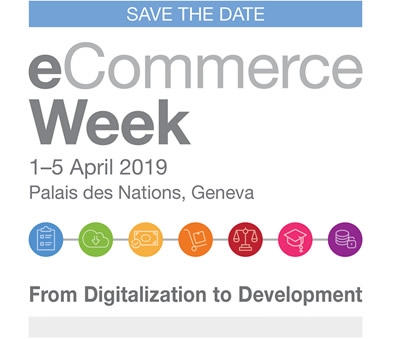African continental integration and sustainable development in the digital era
2 Apr 2019 11:30h - 13:00h
Event report
[Read more session reports and live updates from the UNCTAD E-commerce Week]
The session was moderated by Mr Rashid S. Kaukab (Executive Director, CUTS International, Geneva) who started by explaining the potential of the African continent in e-commerce. He talked about the facilitation agreement and the role of African Continental Free Trade Area (AfCFTA) in helping the implementation of e-services in Africa and the digitalisation for companies. He also noted the empowerment of women in the digital economy by using the sustainable development goals (SDGs).
Mr Stefan Weyler (Project Director, Team Leader eCommerce, Deutsche Gesellschaft für Internationale Zusammenarbeit, GIZ) explained that the model of trade becomes more digital in Africa. Moreover, he said that there are new trade tools for economic opportunities. According to him, using digital trade is very important to strengthen gender equality. Moreover, he talked about the EU digital single market. Finally, he highlighted e-commerce as a tool for developing economic co-operation.
Mr Cissé Kane (African Civil Society for the Information Society, ACSIS) introduced the work of ACSIS in Africa and said that they work in African countries. He noted the integration of e-commerce in those countries. Moreover, he added the challenges of information and communication technology (ICT) infrastructure and digital skills faced by the local businessmen in doing e-commerce. He mentioned the social challenges, political leadership issues, and digital literacy.
Kane said that it is important to encourage local businesses and work with small companies. He talked about the need of Africa to join e-commerce by building strong local markets. Finally, he stressed the investments as a tool to improve the African digital economy.
Ms Candace Nkoth Bisseck (Africa Digital Economy & Women Empowerment Advocate) talked about unleashing women’s potential for digital Africa. She said that there is still gender inequality in e-commerce. She noted the challenges of women in doing e-commerce, such as the lack of confidence in entrepreneurship in some African regions. She mentioned that public institutions have to strengthen the technical support in the digital economy.
Moreover, Nkoth Bisseck highlighted the best practices for women in order to improve economic development. According to her, Alibaba Group is a great example of e-commerce’s leadership for women. She mentioned the eTrade for Women Network, a project of the United Nations Conference on Trade and Development (UNCTAD) which is supporting inclusive e-commerce.
Mr Julien Grollier (Senior Programme Officer, CUTS International, Geneva) explained the e-commerce provisions in trade agreements. He introduced the impact of e-commerce in improving the cross-border trade and adopting sound policies to promote this sector. He mentioned the rise of e-commerce in regional trade agreements (RTAs) like the Association of Southeast Asian Nations (ASEAN) agreement on e-commerce and AfCFTA Phase 2 negotiations.
Moreover, Grollier talked about the types of e-commerce provisions in RTAs, such as market access commitments, facilitation commitments and rules commitments. He added that there is a need for further research. He highlighted the participation of small developing countries in such RTAs and what it will imply for them. Furthermore, he noted the identification trends in e-commerce-related provisions in RTAs.
Furthermore, he asked about the trends in depth and breadth of commitments. What are common notable difference between the range of e-commerce issues covered in North-North RTAs and those in RTAs involving smaller developing countries? He highlighted the regulatory implications of such e-commerce provisions. Finally, he noted the literature review, analysis of RTAs provisions, potential case studies like the Comprehensive and Progressive Agreement for Trans-Pacific Partnership (CPTPP), ASEAN and identification of relevant RTAs (WTO RTA Database).
Ms Beatrice CHAYTOR (Senior Expert, Trade in Services, African Union Commission) talked about her work in the Department of Trade and Industry of the African Union Commission. She mentioned the agenda 2063 as a great tool for implementing e-commerce in African countries. She noted the African Union Summit held in Nairobi, Kenya, in July 2018. Moreover, she explained the tools of AfCFTA in facilitating e-services and e-commerce strategy.
Furthermore, Chaytor said that they are working with the private sector to enable businesses to exchange e-services. She talked about the challenges like the lack of digital skills, infrastructure and data governance. She argued that they are working on technical advice for companies and support for the digital trade strategy. In order to address the digital challenges, she said that we need to build digital infrastructure and support the network among the digital trade players. Finally, according to her, AfCFTA will help facilitate trade in services and trade researches. She mentioned the role of women in African trade governance space. She said that during various negotiations on e-commerce, the delegation of African Union must have women advocating the gender issue.
By Gilles D. Bana
Related event

eCommerce Week 2019: From Digitalization to Development
1 Apr 2019 15:45h - 5 Apr 2019 15:45h
Geneva, Switzerland
